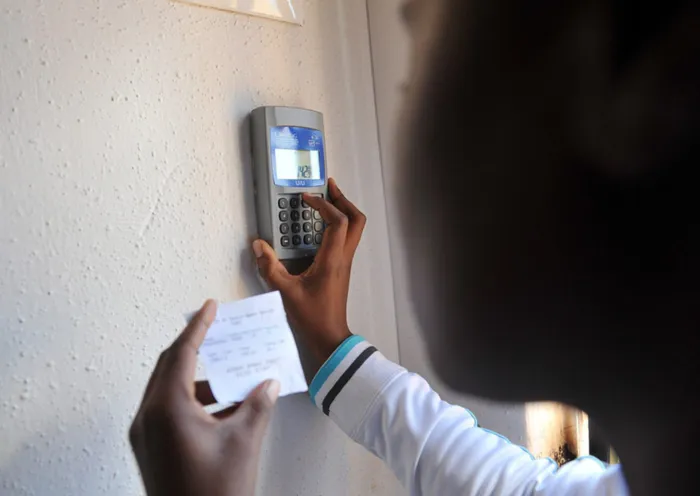
The Democratic Alliance has called for electricity smart meter installations to be stopped because of "electricity bill chaos". Picture: Matthews Baloyi Eskom executives on Wednesday told lawmakers that the board had approved R5.7 billion for the first year of the rollout, which forms part of a broader plan to install 6.2 million smart meters in South African households by 2027.
Image: File
Parliament has called for greater scrutiny and transparency over Eskom’s R5.7 billion smart meter rollout, demanding full disclosure on procurement processes, suppliers, and empowerment plans linked to the large-scale project aimed at curbing electricity theft and losses.
Eskom executives on Wednesday told lawmakers that the board had approved R5.7 billion for the first year of the rollout, which forms part of a broader plan to install 6.2 million smart meters in South African households by 2027.
The initial 600 000 meters are expected to be rolled out by March 2026.
Speaking before Parliament’s portfolio committee on electricity and energy on Wednesday, Eskom senior executive Collin Reddy said the rollout forms part of the utility’s digital transformation programme to modernise its network and reduce non-technical losses, such as illegal connections and electricity theft.
Reddy it is a crucial intervention to address illegal connections and electricity theft, which cost Eskom about 14.7 terawatt-hours (TWh) in losses — equivalent to more than R30bn in revenue last year.
He said the production cost of that lost energy is around R7bn to R8bn versus the revenue loss.
"The board has approved the investment decision. We are now going to the commercial process. We need to go to the investment and finance committee, which then approves the commercial strategy to enable us to go for that 6.2 million programme itself," Reddy said.
"We need to distinguish that as much as we are combining and integrating low-reduction plan, the 6.2 million is a total programme around smart meters, so the country itself."
However, Members of Parliament insisted on more clarity and transparency.
MK Party's MP, Crown Prince Adil Nchabaleng demanded that Eskom disclose details about the tender process, including original equipment manufacturers (OEMs), appointed suppliers, and how small businesses would benefit from the programme.
"This is a major tender, we need transparency on it. Who are the suppliers and how was this process approved and the pricing, particularly from a committee point-of-view, so that we can hold the process as having been fair, transparent and given an opportunity on an equal basis?" Nchabeleng asked.
"It cannot be a closed system, a closed tender, a system that excludes suppliers in general. We want to see suppliers that are South African and the issue of economic empowerment on it. This is a major project where you are going to roll out 6.2 million meters, it's a massive programme. We really want to know how our people, especially SMEs and installers will be empowered."
Reddy said that though Eskom still needed approval in terms of the commercial strategy, it had submitted documentation for approval in line with National Treasury and Eskom procurement protocols and said that details of suppliers would be available once the tendering process formally begins.
He warned that failing to tackle illegal connections and ghost vending would continue to erode Eskom’s financial position and infrastructure.
"The key aspect is if we don't address issues around the impact of illegal connections to transformers, ghost vending, and theft, we are going to see an increase in theft. In the last financial year, Eskom had 14.7TWh loss in energy losses or non-technical losses," Reddy said.
"The aspect of not doing anything will result in us increasing the cost of non-technical losses and increasing the wastage in generation. But if we could actually recover these costs, we can address the issues about damage in equipment, etc. We can use that revenue to improve the services that we do provide to our communities."
Reddy also revealed that Eskom was also in the process of re-evaluating its online vending system.
He said the system has been in existence for many years, service providers had been appointed via an open tender, including commercial banks, retail shops, and smaller spaza shops.
"We are busy putting in this fix in which we are then go out to the market to acquire a new online vending system via open tender, but that is currently within our internal governance processes," Reddy said.
BUSINESS REPORT